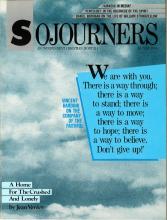Editor’s update: In February 2020, L'Arche International released a report detailing an investigation that found Jean Vanier "engaged in manipulative sexual relationships with at least 6 adult (not disabled) women," and was aware of sexual abuses against women committed by his mentor, Fr. Thomas Philippe. For additional reporting and commentary on this news, visit sojo.net/jean-vanier.
I live with people who have no voice, who are excluded from worldly affairs, who are outcasts, frequently considered mad, and who so often have been excluded—even from the good news of Jesus. I want in some way to be in solidarity with all those in the world who are excluded because of a disability and because of mental handicap. I want to be united too with their parents who suffer so deeply.
I want to speak in the name, also, of those who are homeless. Some are in the prisons of our lands, in overcrowded cells, condemned for their political activity and struggle for justice, for their fidelity to Jesus, or for their deeds against the common law. Others are in those large camps for refugees; others are immigrants in strange lands.
I want to speak in the name of those who are caught in the world of drugs, those enslaved by prostitution, and all the lonely, the old, the hungry, the lepers, the sick, the dying. I want to speak in the name of suffering children, and in a special way, those children who are rejected even before they are born.
I want to speak in the name of all those who feel that they are useless, unwanted, a load on the shoulders of society, a nuisance to the so-called normal people, the rich. Their hearts are hurt. They live in anguish and with a feeling of guilt because nobody has told them that they are precious and important.
Read the Full Article

